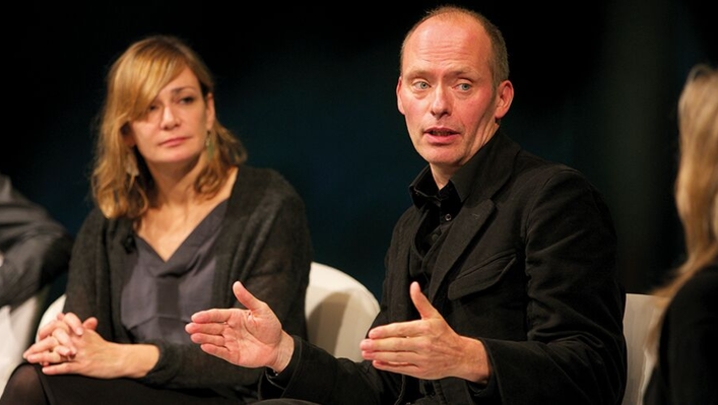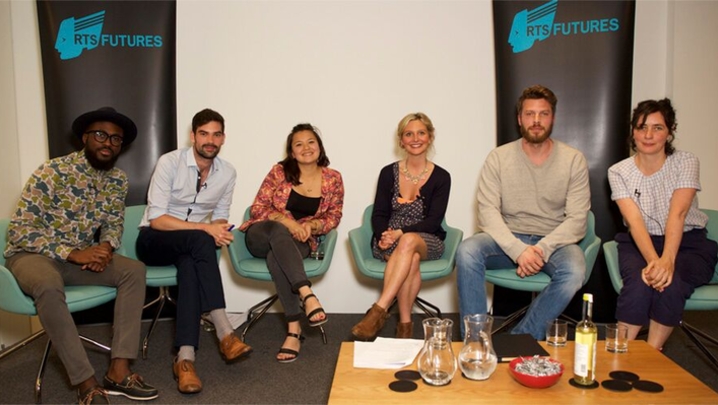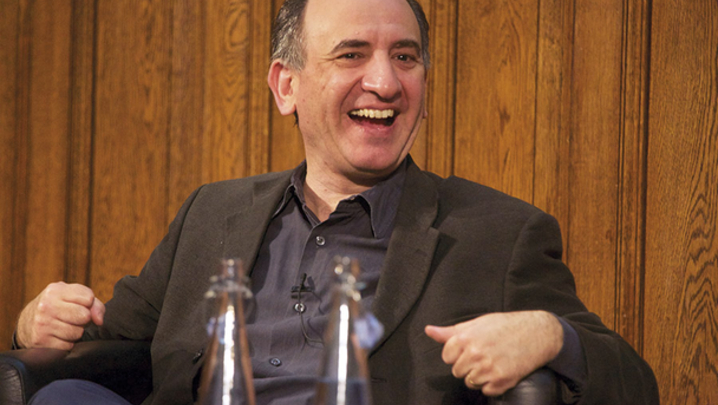As her unit marks its 25th anniversary, Head of BBC Films Christine Langan tells Steve Clarke that the corporation is more serious than ever about backing British movies
Everyone knows that BBC drama is either near or at the top of its game. But what of BBC Films, the broadcaster's infinitely poorer and sometimes neglected cousin?
For the past six years, BBC Films has been led by Christine Langan, a one-time Granada script editor who went on to win acclaim within ITV and beyond.
Langan produced the hugely influential drama series Cold Feet, a show envied by the BBC. Her reputation for identifying high-quality content was enhanced further when she produced two award-winning films that told us insightful things about New Labour: The Deal and the Oscar-nominated The Queen. Both were scripted by the matchless Peter Morgan.
Nowadays, she is overseeing a BBC Films that is punching above its weight more than ever. Remarkably, the outfit will be involved in the release of 15 movies this year. Each of them is partly funded by her total editorial budget of around £9.6m. She also pays for script development.
Latterly, some of the UK's most successful films have reached the silver screen thanks to her. Think of Saving Mr Banks, Philomena and Quartet, all strong performers globally and at home, or Mrs Brown's Boys D'Movie and Alan Partridge: Alpha Papa, big domestic box-office hits.
In return for the investment, the productions receive exclusive TV premieres on BBC TV channels following their cinema showcase.
Earlier this year, BBC Films, which marks its 25th anniversary this month, was given a special Bafta award for its outstanding contribution to British cinema.
This was the same award that went to Film4's Tessa Ross in 2013. Coincidentally, Langan once worked for Ross.
Langan is softly spoken and eternally affable, but not easily deterred. Her golden smile might crack even Vladimir Putin's iciness.
"Nowadays, there aren't enough really good executives working at broadcasters," says her former Granada boss Andy Harries, CEO of Left Bank Pictures. "A lot of them have left to become independents, but Christine is one of the best. The BBC is incredibly lucky to have her.
"She is a proper, proper producer, a great enabler. Christine never raises her voice but she is absolutely undaunted. Who else at the BBC can handle Harvey Weinstein? She should be given a bigger role."
For now, Langan, who joined BBC Films in 2006 to work as an executive producer for her predecessor, David Thompson, appears more than content with her lot.
Both Director-General Tony Hall and Director of Television Danny Cohen are genuinely engaged by BBC Films, she stresses. She no longer feels she is sometimes working in "a vacuum".
"We have never been so absorbed into the family of the BBC," insists Langan. "Under Mark [Thompson], it just wasn't a priority, but Tony is the kind of DG who, from day one, has taken a very specific interest in every area of what the BBC does."
Hall has even managed to fit in a set visit to one of Langan's productions, a location trip to A Little Chaos, a period drama starring Alan Rickman as Louis XIV
Nevertheless, some film people see Langan as fighting an uphill battle against widespread ignorance in the BBC about the movie business.
"The hardest thing about Christine's job is that hardly anyone else at the BBC understands a thing about feature films," opines a seasoned observer of the film business.
Inevitably, money remains tight. Since 2010, Langan's budget has been slashed by £1m. She points out that Film4's editorial budget is around 50% bigger than that of BBC Films.
"We make the money go a very long way, but I could do with more... We need to explore other forms of funding, such as Worldwide..."
Later in our conversation, she adds: "I would like the funding to be greater. I am not talking about five times as much but 50% more would be such a sea change and make a huge difference to what we can do."
As part of the Delivering Quality First review, BBC Films' overhead was reduced. The department used to employ 17 people. Now it is down to 13. No one can rule out further cuts when the next licence fee is set.
Indeed, sceptics have questioned whether the BBC should be in such a risky, financially complex and precarious activity as film-making at all. "That would be a very reasonable, understandable question," offers Langan. "I have no qualms whatsoever in suggesting that we are providing transparent value for money for our viewers.
"Once we take delivery of a film for the channels, all in all, we've probably paid less for a very high-quality production lasting 90 minutes to two hours, often containing the best of British talent, than a piece of peak-time TV drama. And we can repeat those movies for free. We get great terms."
The films that she commissions are strong on period drama, literary fiction and comedy. Some, of course, such as the new Horrible Histories-inspired Bill (a comedy adventure based on "Shakespeare's lost years"), are derived from the hit BBC TV series.
This month saw the release of a new version of Far From the Madding Crowd, starring Carey Mulligan. Upcoming is Armando Iannucci's take on David Copperfield and Ricky Gervais's David Brent film, Life on the Road.
Three feature-length documentaries are also being made. Their subjects are the record-breaking jockey AP McCoy, the enigmatic singer Grace Jones and the youngest-ever Royal Ballet star, Sergei Polunin.
"If it is hard to define BBC Films, it is because it is many things," suggests Langan. "There are a lot of true stories in what we do, brave stories of what it is to be human. What it is to push yourself hard and survive. At the end of the day, we're just looking for compelling stories."
Can she single out any movies made on her watch that she is particularly proud of? "It's an invidious thing to have to do because I am very attached to all of them. You have different feelings around different genres, obviously.
"I always find In the Loop subversive and entertaining. I adore Philomena, which I think shows us at our best."
Why? "When Gaby Tana [the producer] talked to me about it, it seemed to me that Steve Coogan wanted to produce this story with her.
"The more we talked, the more apparent it was that he should write it. I think I helped to encourage him. He didn't feel able to write it alone. He wanted a partner and I introduced him to [screenwriter] Jeff Pope.
"That became a very strong collaboration. I hope that's the kind of thing that BBC Films can do – make introductions and be a creative hub and put people together.
She continues: "I think we probably had a similar feeling around Philomena to that around The Queen [both were directed by Stephen Frears]. That it was quite special. And, in its own way, it did make waves. The Irish authorities ended up opening records previously closed to the public. People reached out and found relatives that they needed to know about."
Langan acknowledges that "hits are very hard to pull off. You need everything to align. You just keep plugging away. There are films that haven't performed very well at the box office, but where I've had personal feedback that is very encouraging."
She accepts that there is a case for BBC Films doing more challenging movies: "I would like to find edgier projects. That is an area for us to work on, but it is a full complement. There is a lot to find and fund."
Is it true that horror films are a no-go zone for BBC Films? "Psychological thrillers are great news," she says. "I am all ears for that kind of thing. We've just got a very low-budget film written and directed by David Farr [a writer on Spooks]; really chilling, creepy and zeitgeisty.
I think some of the audience thought, 'Pride is a gay film, so it's not for me.'
"It is all about the quality of ideas. If it is a violent heist and the characters are a bit stereotyped, then I am not that interested.
"Horror tends to be a very commercial genre that is well taken care of elsewhere."
Among the recent box-office also-rans were a version of Great Expectations, directed by Mike Newell, and another Dickens-inspired movie, The Invisible Woman, focused on the life of the novelist's mistress, Nelly Ternan.
While critics loved last year's feel-good feast that was Pride, a story of how the gay community raised money to support the 1984-85 miners' strike, it didn't draw in cinema audiences across the UK.
Says Langan: "I don't know how to say this delicately, but I think some of the audience thought, 'It's a gay film, so it's not for me.' I guess the fact that it was called Pride made that pretty plain. Once they see the film, audiences love it.
"Outside London and the South East, it was quite hard to get them in. I will be interested to see how it does on TV. It could do really well."
Langan comes from a blue-collar, Irish immigrant family. She was raised in Tottenham, north London.
Despite going to Cambridge (courtesy of a grammar school education), gaining a foothold in broadcasting was difficult.
"I couldn't find a way in. I mistakenly ended up working for a business writing company because they'd said something about corporate video scripts."
She then got a job as a copywriter at an ad agency. "At the same time, I was trying continually to get into film," Langan recalls. "That's what I loved. But I didn't have any contacts and I didn't want to be a runner."
Gradually, her facility as a wordsmith led to work assessing film scripts. Her first break was being employed by film-funding body British Screen as Tessa Ross's assistant.
"It was brilliant working for her. The British film industry wasn't as big or as successful as it is now. She was funding development.
"Tessa was very generous in letting me read things and having me sit in on meetings."
Script editing for Granada in Manchester (initially for daytime soap Families) came next. Langan had found her niche.
Her aptitude for working with writers has helped drive her career forward. Coincidentally, perhaps, Langan's partner is the TV scriptwriter Christian Spurrier. His credits include Spooks and Silent Witness.
"Writers are sometimes abused," says Langan. "Or they are paranoid. They are very sensitive people who do a very difficult job. They need to be sensitive to come up with the goods.
"Sometimes, in film, they can be slightly eclipsed by the needs of production or the director, or they don't see eye to eye. So there are often things that you have to resolve or finesse."
She admits that her job requires endless diplomacy: "At times, that is tiring. It's part and parcel of the business. I would say that I am working for a very fair-minded organisation. I am not here to be Cruella de Vil. It's not the ferociously aggressive, cutting edge of the commercial world. The BBC is a bigger project than that."
What, then, of Film4's apparently higher profile? There is no sense that she is envious of Film4's success and carefully acquired reputation for risk taking
"Channel 4 has brilliant marketing," Langan acknowledges. "There is a Film4 television channel. That automatically puts you in a different place.
"It's a smaller bull's eye, in a way, because it's about provocation and edge and purely film-makers.
"Tessa's MO was all about bringing film-makers on at all costs. We want to bring film-makers on but we are also very mindful of BBC TV audiences."





